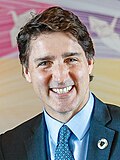Draft:2025 Canadian federal election in Ontario
| |||||||||||||||||||||||||||||||||||||||||||||||
122 of 343 seats (35.6%) in the House of Commons | |||||||||||||||||||||||||||||||||||||||||||||||
|---|---|---|---|---|---|---|---|---|---|---|---|---|---|---|---|---|---|---|---|---|---|---|---|---|---|---|---|---|---|---|---|---|---|---|---|---|---|---|---|---|---|---|---|---|---|---|---|
| |||||||||||||||||||||||||||||||||||||||||||||||
| |||||||||||||||||||||||||||||||||||||||||||||||
In the 2025 Canadian federal election, there will be 122 constituency elections contested in the province of Ontario. This will be the first federal election where the city of Toronto will have less seats than its surrounding municipalities within the Greater Toronto Area. Federal Conservative leader Pierre Poilievre will be contesting his seat in Ontario, in the Ottawa riding of Carleton.
2022 electoral redistribution
[edit]The 2025 Canadian federal election will be the first election to utilize the electoral districts established following the 2022 Canadian federal electoral redistribution. The House of Commons will increase from 338 seats to 343 seats, with Ontario gaining one seat in an increase from 121 to 122. This ensures that the the average population per constituency in Ontario is 116,590 (according to the 2021 Canadian census), which is 8,742 more people per electoral district than the national average.[2]
Summary of results
[edit]| Party | Votes | Seats | ||||
|---|---|---|---|---|---|---|
| Liberal | pp | 0 / 122 (0%)
|
||||
| Conservative | pp | 0 / 122 (0%)
|
||||
| New Democratic | pp | 0 / 122 (0%)
|
||||
| Green | pp | 0 / 122 (0%)
|
||||
| People's | pp | 0 / 122 (0%)
|
||||
| Independent | pp | 0 / 122 (0%)
|
||||
Comparison with national results
[edit]| NOTE: The following information is based on the 2021 Canadian federal election for illustrative purposes. Before moving to the article mainspace, these numbers should be corrected to the results of the 2025 election. |
| Party | Popular vote % | Seats in caucus | |||
|---|---|---|---|---|---|
| ON | Natl. avg. | +/- | |||
| Liberal | 39.3 | 32.6 | 78 / 160 (49%)
| ||
| Conservative | 34.9 | 33.7 | 37 / 119 (31%)
| ||
| New Democratic | 17.8 | 17.8 | 5 / 25 (20%)
| ||
| Green | 2.2 | 2.3 | 1 / 2 (50%)
| ||
| People's | 5.5 | 4.9 | unrepresented party | ||
References
[edit]- ^ On March 20, 2024, the government introduced the Electoral Participation Act, which included an amendment to the Canada Elections Act that would change the fixed election date to October 27, 2025, to avoid conflicting with the Hindu festival of Diwali, as well as municipal elections in Alberta.[1]
- ^ "Canada Elections Act" (PDF). Parliamentary Debates (Hansard). Canada: House of Commons of Canada. March 20, 2024. p. 21765.
- ^ "New House of Commons Seat Allocation" (Press release). Gatineau: Elections Canada. July 8, 2022. Archived from the original on July 8, 2022. Retrieved July 8, 2022.





